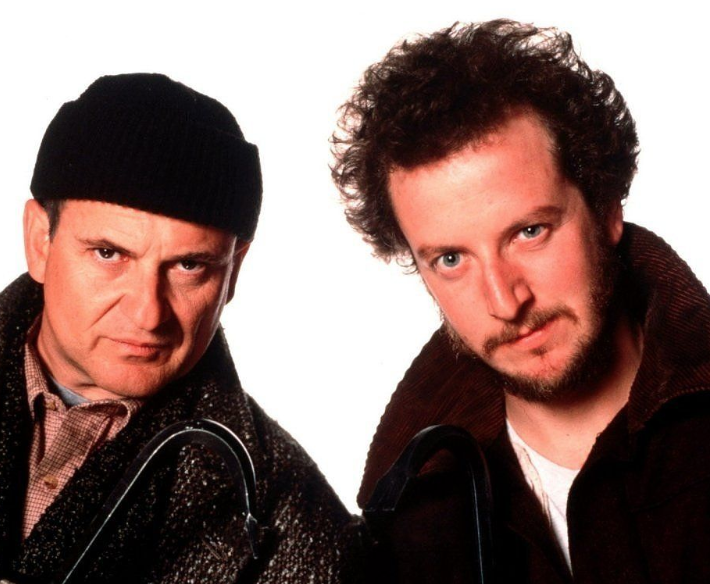We already knew the 90s were a Golden Age in so many ways. A period not just when casual comfort was deemed the height of fashion and record stores abounded, but also in which unrest felt remote (at least to Americans, so fond of their ever-bursting bubble) and pop culture experienced a renaissance that, like the 80s, would be deemed retrospectively cheesy. Yet some “relics,” despite their maudlinness and increased implausibility, have managed to stand the “test of time” by sheer virtue of remaining a yearly staple. This, of course, refers to the mandatory viewing of Home Alone at least once during the month of December.
Centered on eight-year-old Kevin McCallister (Macaulay Culkin, who John Hughes had already given a big break to with 1989’s Uncle Buck), the narrative commences with the oversized McCallister brood (for, back then, middle class families believed in breeding more than just two children because upward mobility was a thing) preparing for a trip to Paris for Christmas (yes, everyone still wonders what the hell Kevin’s dad did for a living to afford such a lavish vacation for so many people). Kevin, as usual, has been deemed the runt of the litter (despite his cousin, Fuller [Kieran Culkin], being the bed wetter), finally snapping when Buzz eats all the plain cheese pizza (of which there was a precious supply) and pushing him into the counter to set off a chain reaction of chaos (kind of like whoever sold the unidentified animal in the “seafood market” in Wuhan).
Kevin, of course, is blamed for everything and ordered to go to his room, while the nefarious Buzz is somehow treated like a saint unworthy of tarnishing. In the interim, Harry (Joe Pesci), the “brains” of the operation that is selectively referred to as Wet Bandits, has infiltrated the house in the guise of a police officer “checking up on things” (oh how 1950s the 1990s seem now). Ascertaining his suspicion that the family will soon be on vacation, Harry fades into the background as quickly and mysteriously as he appeared, conveying the information to his “business” partner, Marv (Daniel Stern), so that they can add it to the list of houses to hit up on their Christmas binge of robberies. Because yes, “back in the day,” such currently antiquated practices as traveling freely and congregating in a large (family) group was normal. In short, leaving your living space was normal. Thereby allowing the once lucrative profession of home burglary to flourish, along with the alarm and alarm installation business–so shrewdly marketed during this era to yuppies by capitalizing on their inherent fear of losing everything they had worked for so as to surpass their parents in wealth.
In the present, one wonders how Harry and Marv would fare with the enforced lockdowns in most countries and, so far, in America, merely the “strong encouragement” to stay at home (reinforced by the fact that most businesses have closed “temporarily”–little do they know…) has made the “element of surprise” for burglary impossible. For how can one possibly sneak discreetly through the kitchen, living room or bedroom (if one is fortunate enough to have this many rooms in their spatial layout) window when it’s constantly occupied? When nobody ever fucking goes out?
Of course, maybe if they had saved up enough money from stolen goods for a powwow with The Invisible Man, they might bring a new innovation to the burgling game. But it’s pretty clear from the low-level nature of their criminal prowess (and the crimes themselves) that they wouldn’t have the connections (nor the financial means) to fuck with The Invisible Man, let alone convince him to give up one of his precious few suits for their endeavor when we all know rich people never help out the less fortunate (though they have been known to aid the shady as fuck). Not even fellow criminals.
And so, inevitably, Harry and Marv would try to pull some classic “Wet Bandits antics” for their own means of “invisibility” (doing something Lucy Ricardo-inspired, like trying to paint themselves the same color as the wall next to the window or door they wanted to break through). Resultantly, every household presently adhering to lockdowns, quarantines and “strongly recommended” social distancing would have someone in the house to grab a knife out of the block (or, also likely, since we’re assuming it’s America, a gun out of the nearest drawer) in defense against these bedraggled small-time crooks (that even an eight-year-old could take on, albeit with more panache).
The intensity with which a resident feels particularly protective of their worldly possessions has also only augmented during these times, when we are all sensing the imminence of a recession and the scarcity of luxuries that goes with it. Alas, home burglary is just another profession that has been effectively wiped out by the coronavirus. Not just because everyone’s home, but, to boot, because even burglars are expected to self-quarantine these days (whether that means a real “home,” prison or, if you’re one of San Francisco’s “lucky” anointed, a semi-posh hotel).






















